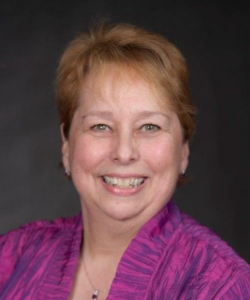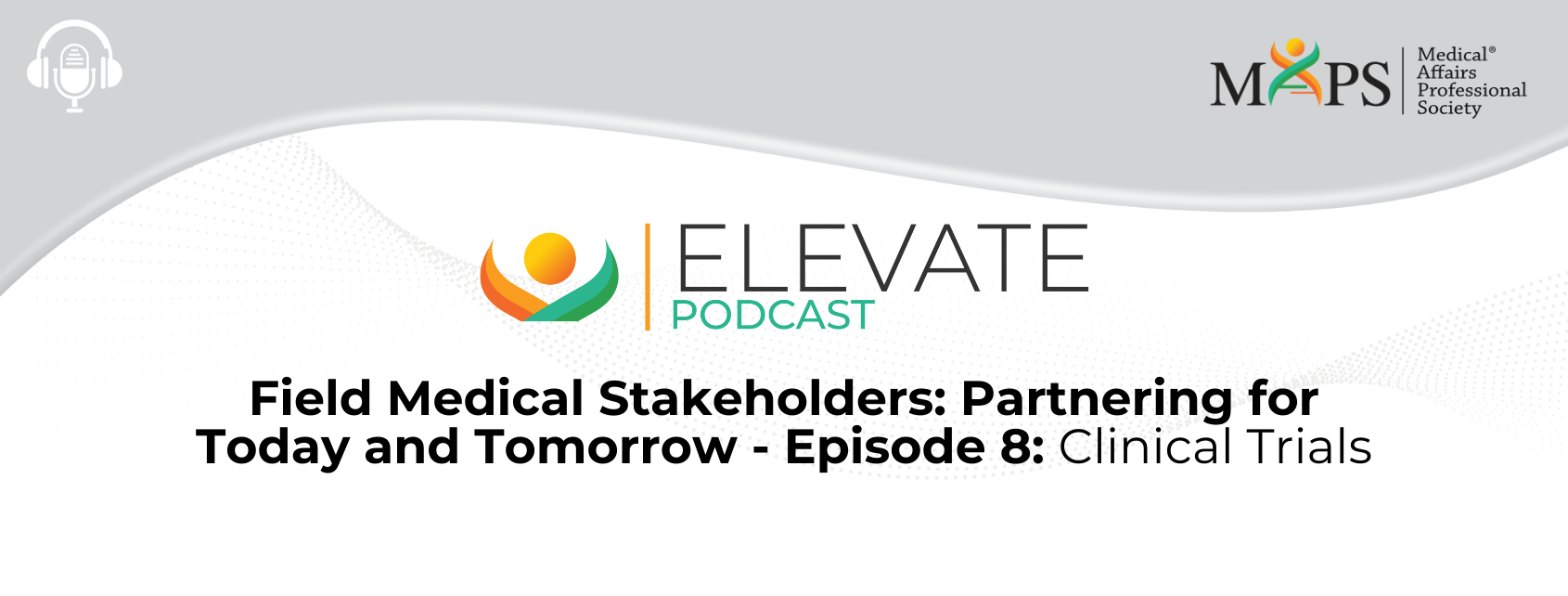Objectives:
At the end of this series of podcasts, the participant should be able to:
· Discuss the functions and activities of key internal partners
· Identify potential areas for compliant collaboration by MSLs with key internal partners

MODERATOR: Kathryn Gann, PhD

INTERVIEWER: Robert Groebel, VP

SPEAKER: Ricardo Maamari, MD, NCMP
Following is an automated transcription provided by otter.ai. Please excuse inaccuracies.
Kathryn Gann 00:00
Welcome to the Medical Affairs Professional Society Field Medical Focus Area Working Group’s podcast series, entitled “Field Medical Stakeholders: Partnering for Today and Tomorrow.” In this eighth podcast, we will be discussing clinical trials. I’m Kathryn Gann. I’ll be the moderator for this podcast. I serve as a member of the field medical focus area Working Group. Currently, I’m an independent consultant in Medical Affairs. Having spent my 30 year career as an MSL and MSL manager and an MSL trainer. Our legal disclaimer is as follows. The views expressed in this recording are those of the individuals and do not necessarily reflect on the opinions of maps or the companies with which they are affiliated. This presentation is for informational purposes only, and is not intended as legal or regulatory advice. We encourage you to engage in conversations about partnering with field medical stakeholders with other maps members by the community portal on the maps website. Simply log in with the email address and password associated with your maps account and click on the discussion tab. Then scroll down the field medical to post a question or review previous postings. The objectives for this series of podcasts are that at the end of this series, the participant will be able to one discuss the functions and activities of key internal stakeholders and to identify potential areas for compliant collaboration by MSL with key internal stakeholders. I’d like to thank today’s panelists for sharing their subject matter expertise with the maps membership. speaking today are Robert Groebel vice president global medical strategy at monocle. And Robert will be our interviewer and Ricardo Maamari Global executive medical director established medicines and Rare Diseases at Novartis oncology, and rochat. Ricardo will be our interviewee. So, Robert, as I turn this over to you, could you please start us off by providing some information about your current position, how long you’ve been in industry what you were doing before, and then I’ll let you take it away.
Robert Groebel 02:16
Thanks very much, Kathy. It’s Robert Groebel. I’m the global Vice President for medical strategy at monocl. We’re a cloud based software as a solution provider focused on an insights platform designed specifically for Medical Affairs. The organization provides data and insights relative to scientific experts across therapeutic areas in a global nature. Before I joined monocle at the beginning of the pandemic, I had led medical strategy at Viva for five years. And prior to that I had both commercial and medical roles at both Behringer Ingelheim and Shire. That’s a little bit about me, Ricardo, what about you? are good.
Ricardo Maamari 02:57
Thank you, Robert. Well, my name is Ricardo Maamari. I’m a physician by way of background. I have been in practice for 15 years. And then I switch to the pharmaceutical industry holding different positions, both in the US and under the global capacity.
Robert Groebel 03:17
Great. So when we reflect on the title of today’s podcast focused on medical stakeholders, and partnership, can you explain what you do and what your group is responsible for it Novartis?
Ricardo Maamari 03:30
Absolutely. Well, at this time, I am the global executive director in global medical operator within Novartis oncology is a very strategic position because I oversee three MDS working in different therapeutic areas too, and these are working on establish compounds. And one of the is working on array of VCs called cross. So, the bottom line is a young designer responsible for all the objectives to be met, not only an established product, but also on dialysis.
Robert Groebel 04:06
I understand so so how is that organization structured within Novartis? Well, we are thinking about the giant company.
Ricardo Maamari 04:17
So as you can imagine, the organization who very complex but trying to make this long story short. Novartis oncology, has a CMO and the Vice President of three different therapeutic areas, hematology, gastrointestinal and established optimized lung this in my case, I oversee, established optimized reporting directly to the Vice President of solid tumors.
Robert Groebel 04:50
And who are your internal customers who who are you partnering with on a regular basis?
Ricardo Maamari 04:54
An excellent question, Robert. My customer can imagine my Yes, my main stakeholders are a global monitoring a global medical communication, low working development, lower commercial, and also the local offices, because in the model has offices across the world. So my interactions are with medical from region, Europe, Asia, Pacific, emerging countries, Japan. So a us a way of saying a ion impairment and communication with everybody. Not only are the medical perspective on sometimes, or the GVA perspective, or even a commercial perspective, because we are a team working together in global trying to support not only global activities, but also the regional or even local activities in countries that don’t have a very significant budget.
Robert Groebel 05:55
And so when you think about the three MDS that you have working in this capacity, and then your role, what is what’s your contribution, you know, to the larger group? Alright, a mainly a medical support and in the medical strategy, not only for rare diseases, but also for established optimized products. So you’re recognizing the size of Novartis? Is there a US group that’s similar to your group globally?
Ricardo Maamari 06:28
Yes, I mean, during normal conditions, I’m located in the global building, and the US colleagues are located is just next door, everybody seems to stand over anyway. Yes, the US organization a just act as a local office of saying, you know, somebody from Poland, from Canada, or, you know, or from any other country in the world. But of course, we are speaking up about the us that the most powerful and strongest market for any pharma company. That’s why the US organization really very important, below what is more broad, because global is like, you know, the mama bear that is supporting all the countries all over the world. And then global medical leadership is key to have the most important regions such as region, Europe, or Japan, or Latin America and Canada. I see. So are there are there any differences amongst these groups? I mean, when you reflect on the US versus rest of world, do you operate in a similar fashion? Are there things that are no, no, no, no, the US organization has its own medical agenda, and its own priority. We all welcome support, but the US has a final word on it. And the same applies to any other region or, or local office, the big difference is that the US, you know, is a strongest markets for warranties. So that’s why it’s like it’s a big organization within the company. If we compare the us or our decision to other local organizations, such as maybe France or the UK. When we say us, we know that it’s really number one priority for the whole organization, even on the global perspective, what is important for me to say that nobody is nothing work in the old fashioned way, saying that a global medical affair or Ws, global Medical Affairs, we only take care of products already approved, or only three being faithful studies, lower medical costs a very important role as well, sometimes in phase two in phase two or phase three studies. So I will say that in Novartis global Medical Affairs, I’m trying to answer your question directly rather than us medical officers. We also take care of clinical trials.
Robert Groebel 09:03
I understand how groups work together. What does collaboration look like?
Ricardo Maamari 09:11
Once again, that depends on the priorities, but they we have a monthly meeting with the US. And sometimes the budgets come from the US sometimes their budget come from a global directly, of course, that will depend on FDA request or an email request. But we work together. Absolutely.
Robert Groebel 09:31
And but it’s important to say not only to the US with all the regions and countries in the world, how do you see the role of the How do you see the role of the MSL?
Ricardo Maamari 09:41
Well, that’s an excellent question. And when I was invited to attend this podcast, I was really happy because at this time, I’m working on a global organization. But in the past, I have worked for the US organization, even in different companies. I always voice my concern about the medical insurance because I always believed that they didn’t get the credit that they really deserved. I really considered or the medical liaisons are key for us Medical Affairs, specifically. And in a different degree for global medical of three years. I posited that all the all the potential and all the possibilities that the medical liaisons may have within our organization a are not, you know, fully explored. So for me, a I don’t really like when I hear that the Senate representatives are the face of the company, because the sales representative a DOM, represent at all global Medical Affairs, or us Medical Affairs. From now on, I will just say, Medical Affairs, I think that the medical use of the face of the company from a scientific standpoint, their medical liaisons are the ones that really gain their medical expert stability on the company. So that’s why I really appreciate the value of the medical liaison. And sometimes I really felt disappointed, because I know that they could be working in other activities. But so far, they have just limited, you know, to interaction with key opinion leaders or medical experts. And that said, but from a clinical perspective, I can even share with you my experience working with medical liaisons in clinical trial.
Robert Groebel 11:35
That’s a great response. And I’ve spent the last five or six years really focused on helping msls drive value and and as someone who who gets to see this across the industry, we see lots of ways that they’re, they’re partnering. But do you have any specific best practices, you can point to? How people could better partner with their MSL?
Ricardo Maamari 11:56
Yes, yes, I’m a once again, I’m so happy to speak about this, if I can help somebody in the in the final decision, when we are working on the clinical trial, not only at the very beginning, but also, you know, during the clinical trial, and even at the end of the clinical trials, agencies, or the medical liaisons should be invited and should be a part of a CTT. Because they’ve medically, you know, I, I will say this in a humorous way, if you like, you know, they are a little bit the detectives of the company. So when you’re planning a clinical trial, and we are planning, you know, the different investigators that we will be working with, I am really positive about the medical needs some come out. They know the site, they know the investigator, they know it investigator has real experience or not into clinical trials. They know the administrator, they know if they say be surprised if they know it blank, this is not busy at all. So first off, I would say that the medical liaisons are very important, right, you have a system to ask, once you’re seated in the head office, you know, we really don’t know what’s going on out there. The liaisons can share without I’m bringing important information on the table about which database investigators to be recruited, maybe doesn’t know the first thing that comes into my head. And then if I during the clinical trial, we also rely on investigators about what’s going on with this law recruitment, please Can you reach out to the investigator and let us know if there is an issue if he has any problems, he wants to communicate with somebody located in the main headquarters and the beginning of the trial once again, if ethically So, help us a lot you know about the end of trial termination about any any queries that need to be completed and until the the database is not clean at all, we cannot block it. So if I have to give you a deal example, we a wanted to tell him in a clinical trial because they the brother was already in the market and I said was redacted in the in the protocol that trial Could it be ongoing only until the product or a become commercially available? So in the headquarters, you know and even more during the pandemic, although it happened before the time then it was gonna be very difficult for us to reach out all investigators First off, as I said before, is like you know, we are locked up in the office and we don’t have interaction and we don’t have that relationship with investigators or their medical interns. Right. So when it was time to terminate the study, we reached out to the to the medical liaison we asked them to conduct investigate, although we can decide to explore this an alternative to end the trial to how we investigate or buy in the trial termination. And that was really possible and doable. So because of the assistance we got from the medical liaisons, we all know that sometimes, you know, investigators are not responsive. We know that many times we left voicemails, you know, we send emails, and we never have a response. So when we need their response ASAP, we know that the medical liaisons are there, they go out there, and they get the information to us, you know, as soon as they can. And also, they, as I said, they really share with us a lot of information, you know, before the trial, during the trial and the end of the trial, that is really key. Once again, I really consider that the work of a medical liaison is key. And it’s not fully appreciated yet, but it should be. And if we speak at all the global level, in Europe, the the organization are really very different from how they are in the US. So maybe a medical liaison is also a medical adviser on you have one country in which the medical liaison is the only medical Person A represent in that country. Once again, that contribution is really valuable, because we rely on the medical liaison on the medical colleagues, you know, to share with you not who I quarter, you know, in our offices locked up is kind of our, you know, we know, we have information about this site about investigator, we can rush the investigator, you know, through recruitment through the medical exams. So that’s my take home message from me to everybody, that the medical liaison should be a very important part of the CTP. Because I do consider that they are key to Medical Affairs, they are the same, or the same basic knowledge of the company, they are even the face of the medical reputation of the company.
Robert Groebel 16:51
Well, I mean, I think that’s a terrific answer. And when you think about just the sheer volume of clinical trials that are going on today, this role sounds as if it’s mission critical to ensure success in speeding the speeding the registration, speeding the database, or the closure of all trials and with without them it would be much more difficult.
Ricardo Maamari 17:12
Yes. And I really very honest with everybody, we went through that. And the only way that we could terminate the study, you know, having everybody happy and all the investigators lane, it was through the work of America. And I’m dealing with investigator who the study coordinator.
Robert Groebel 17:30
Yes, absolutely. Well, thanks so very much for your time today record. My pleasure. My pleasure.
Kathryn Gann 17:38
So Robert, Ricardo, I want to thank you both for participating today. And I think now our audience should have a better understanding of several things. One, the of the global medical leadership and the relationship with the country specific medical leadership, and then also the clinical trials and from global through country specific. And finally, the value that the MSL is bring to all of that, and how they can be so useful and so helpful in clinical trials, and in the successful recruitment and continuation of clinical trials. So, Ricardo, I want to thank you for singing the MSL praises today. And with we really appreciate it, we really appreciate your vote of how much value we bring. So, this has been our eighth podcast in our series on the topic of field medical stakeholders Partnering for today and tomorrow. And if you’re a maps member, thank you so much for supporting that. If you’re not yet a maps member and would like access to additional resources in this area, please visit the maps web website to explore joining us and that website is Medical Affairs.org forward slash membership. This concludes the podcast



